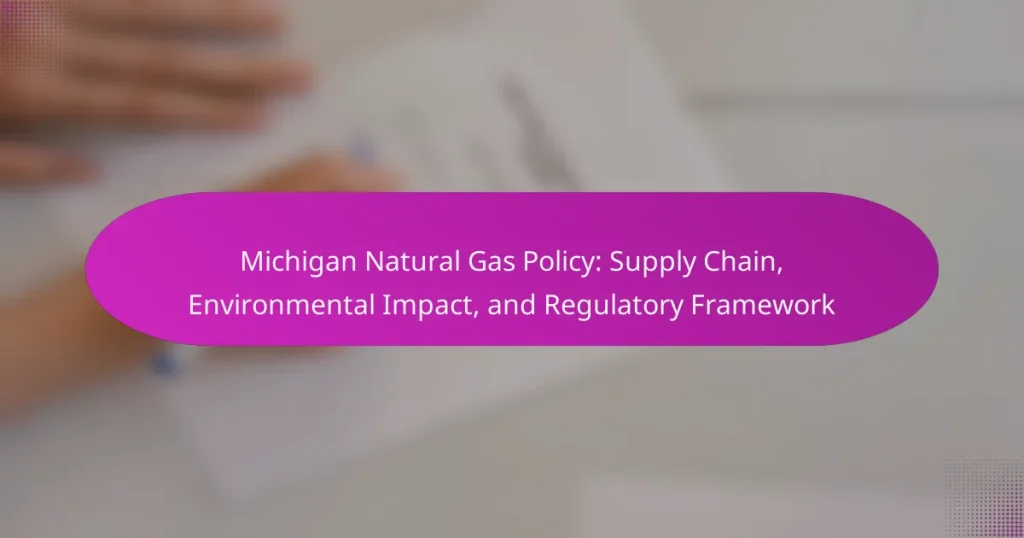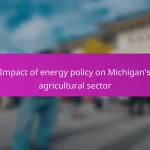
What is Michigan Natural Gas Policy?
Michigan Natural Gas Policy refers to the state’s framework for managing natural gas resources and distribution. It encompasses regulations, supply chain management, and environmental considerations. The policy aims to ensure reliable energy supply while promoting safety and sustainability. It includes measures for pipeline integrity and emissions reduction. The Michigan Public Service Commission oversees the implementation of these regulations. The policy also addresses the economic implications of natural gas usage for residents and businesses. It is designed to support the transition to cleaner energy sources.
How is Michigan’s natural gas supply chain structured?
Michigan’s natural gas supply chain is structured through a series of interconnected components. It begins with the extraction of natural gas from underground reservoirs. This gas is then processed at facilities to remove impurities. Transportation follows, utilizing pipelines to move the gas to distribution centers. Local distribution companies take over from there, delivering gas to residential and commercial customers. Regulatory agencies oversee this entire process to ensure safety and compliance. The Michigan Public Service Commission plays a key role in regulating rates and service quality. Overall, this structured approach ensures a reliable supply of natural gas across the state.
What are the key components of the supply chain in Michigan?
The key components of the supply chain in Michigan include production, transportation, distribution, and consumption. Production involves the extraction of natural gas from underground reserves. Transportation refers to the pipelines and infrastructure used to move natural gas to processing facilities. Distribution encompasses the delivery of natural gas to end-users, including residential, commercial, and industrial consumers. Consumption is the final stage where natural gas is utilized for heating, electricity generation, and other purposes. Michigan’s supply chain is supported by a network of regulatory frameworks that ensure safety and efficiency in operations.
How do these components interact within the supply chain?
The components of the supply chain interact through a series of processes that include procurement, transportation, storage, and distribution. Each component relies on the others to ensure a seamless flow of natural gas from extraction to end-users. For example, procurement involves sourcing natural gas from suppliers, which is then transported via pipelines. Transportation requires coordination with storage facilities to manage supply levels. Additionally, distribution networks ensure that the gas reaches consumers efficiently. The interaction of these components is critical for maintaining supply reliability and meeting regulatory standards. Efficient communication and logistics management among these components help reduce delays and optimize costs within the supply chain.
What are the environmental impacts of natural gas in Michigan?
Natural gas in Michigan has significant environmental impacts. It contributes to greenhouse gas emissions, particularly methane, which is more potent than carbon dioxide. Methane leaks occur during extraction, processing, and transportation. These leaks can undermine the climate benefits of using natural gas over coal. Additionally, natural gas production can lead to water contamination and habitat disruption. Fracking, a common extraction method, poses risks to groundwater resources. Air quality can also be affected by emissions from natural gas facilities. The Michigan Department of Environment, Great Lakes, and Energy notes these concerns in their assessments.
How does natural gas extraction affect local ecosystems?
Natural gas extraction negatively affects local ecosystems through habitat destruction and pollution. The process often requires clearing land, which disrupts native flora and fauna. This can lead to loss of biodiversity in affected areas. Additionally, the extraction process can result in soil and water contamination. Chemicals used in drilling can seep into groundwater supplies. Air quality may also degrade due to emissions from extraction activities. Studies indicate that wildlife populations can decline in regions close to extraction sites. These impacts highlight the need for careful regulatory oversight in natural gas extraction.
What measures are in place to mitigate environmental damage?
Measures in place to mitigate environmental damage include regulations, technology, and best practices. The Michigan Department of Environment, Great Lakes, and Energy enforces laws to limit emissions. Technologies such as carbon capture and storage are implemented to reduce greenhouse gas emissions. Best practices in natural gas extraction minimize land disruption and water usage. Regular monitoring ensures compliance with environmental standards. Public engagement initiatives promote awareness of environmental impacts. These measures collectively aim to protect Michigan’s natural resources while supporting energy needs.
What is the regulatory framework governing natural gas in Michigan?
The regulatory framework governing natural gas in Michigan is primarily established by the Michigan Public Service Commission (MPSC). The MPSC oversees the rates and services of natural gas utilities in the state. It ensures compliance with state laws and regulations regarding safety, reliability, and environmental standards. The Natural Gas Act is a key piece of legislation that provides the MPSC with authority to regulate the natural gas industry. Additionally, federal regulations from the Federal Energy Regulatory Commission (FERC) also impact natural gas operations in Michigan. These regulations ensure that the natural gas market operates fairly and efficiently. The framework aims to balance consumer protection with the needs of the industry.
What agencies are responsible for regulating natural gas policies?
The agencies responsible for regulating natural gas policies include the Federal Energy Regulatory Commission (FERC) and the U.S. Department of Energy (DOE). FERC oversees interstate natural gas transportation and wholesale sales. The DOE manages national energy policy and promotes energy efficiency. In Michigan, the Michigan Public Service Commission (MPSC) regulates the state’s natural gas utilities. The MPSC ensures safe and reliable service while promoting consumer protection. These agencies work together to establish and enforce regulations that govern natural gas supply, pricing, and safety standards.
How do state and federal regulations differ regarding natural gas?
State and federal regulations regarding natural gas differ primarily in jurisdiction and scope. Federal regulations are established by the Federal Energy Regulatory Commission (FERC) and focus on interstate natural gas transportation and pricing. State regulations, on the other hand, are enforced by state public utility commissions and govern local distribution, safety, and service standards.
For example, the Natural Gas Act of 1938 governs interstate commerce in natural gas, while state laws address local distribution and consumer protection. Additionally, states may have specific environmental regulations that exceed federal standards. This dual regulatory framework allows for both uniformity in interstate commerce and localized control over utility services.
How do supply chain dynamics influence environmental policies?
Supply chain dynamics significantly influence environmental policies by shaping resource allocation and operational practices. Companies often adjust their supply chains to meet regulatory requirements and sustainability goals. For instance, the adoption of greener logistics and sourcing practices can lead to reduced carbon footprints. Additionally, stakeholders increasingly demand transparency regarding environmental impacts. This pressure can result in stricter compliance measures and innovative practices. Research indicates that companies with sustainable supply chains often experience better regulatory alignment and public perception. Therefore, effective supply chain management is crucial for developing and implementing robust environmental policies.
What role does regulation play in shaping the natural gas supply chain?
Regulation plays a critical role in shaping the natural gas supply chain. It establishes safety standards for extraction, transportation, and distribution. Regulatory bodies ensure compliance with environmental protection laws. This oversight minimizes risks associated with gas leaks and emissions. Regulations also influence pricing structures and market competition. They can promote fair access to infrastructure for all suppliers. Furthermore, regulations guide investment in new technologies for efficiency. In Michigan, specific regulations govern the operations of natural gas companies. These rules help balance energy needs with environmental concerns.
What are the challenges facing Michigan’s natural gas policy today?
Michigan’s natural gas policy faces challenges related to supply chain disruptions, regulatory changes, and environmental concerns. Supply chain issues have been exacerbated by global events, affecting the availability and cost of natural gas. Regulatory changes at both state and federal levels introduce uncertainty for energy providers. Environmental concerns focus on the impact of natural gas extraction and usage on climate change. Additionally, public opposition to fossil fuels complicates policy implementation. These challenges require careful navigation to balance energy needs and environmental sustainability.
How can stakeholders address supply chain vulnerabilities?
Stakeholders can address supply chain vulnerabilities by enhancing collaboration and communication. This involves sharing critical information across the supply chain. Implementing technology solutions can improve transparency and traceability. Regular risk assessments help identify potential vulnerabilities. Diversifying suppliers reduces dependency on single sources. Establishing contingency plans prepares stakeholders for disruptions. Investing in local sourcing can strengthen supply chains against global risks. According to a 2020 report by the World Economic Forum, resilient supply chains are essential for mitigating risks and ensuring sustainability.
What best practices can be adopted to enhance regulatory compliance?
Implementing comprehensive training programs is essential to enhance regulatory compliance. These programs ensure that employees understand regulations and their implications. Regular audits should be conducted to identify compliance gaps. This practice helps organizations address issues proactively. Establishing a clear compliance framework is also crucial. This framework should outline roles, responsibilities, and procedures. Utilizing technology for monitoring and reporting can streamline compliance efforts. Automation reduces human error and increases efficiency. Engaging with regulatory bodies fosters better understanding and collaboration. This relationship can lead to more effective compliance strategies. Finally, maintaining thorough documentation is vital. Accurate records support compliance verification and audits.
Michigan Natural Gas Policy encompasses the state’s regulatory framework for managing natural gas resources, focusing on supply chain management, environmental impacts, and safety measures. The article outlines the structured supply chain from extraction to consumption, highlighting key components such as production, transportation, and distribution. It also addresses the environmental implications of natural gas usage, including greenhouse gas emissions and habitat disruption, while detailing regulatory oversight by agencies like the Michigan Public Service Commission. Additionally, the article discusses the challenges facing the policy today and best practices for enhancing compliance within the natural gas sector.


